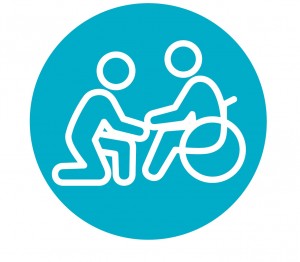Posted January 28, 2022, and revised February 10, 2022

Icon of two adults, facing each other and touching hands. One is sitting in a wheelchair.
This post updates information provided in a Social Work Blog post of December 17, 2021. The January 28, 2022, post was revised on February 10, 2022, to reflect changes since publication.
Following its November 12 release of guidance for nursing home visitation during the COVID-19 pandemic, CMS released three versions of frequently asked questions (FAQs) clarifying the guidance. NASW upholds both the right of nursing home residents to receive visitors and the need for vaccination and other public health measures to decrease COVID-19 transmission and severity. The association offers resources to help social workers engage with clients, colleagues, family, and friends about COVID-19 vaccination.
November 12 Guidance
On November 12, 2021, the Centers for Medicare & Medicaid Services (CMS) released updated guidance to Medicare- and Medicaid-certified long-term care (LTC) facilities (commonly known as nursing homes) regarding visitation during the COVID-19 pandemic. As of that date, CMS explained, nursing home residents were permitted to receive visitors of their choice at any time of day, indoors or outdoors, even during COVID-19 outbreaks. At the same time, CMS reiterated the importance in infection prevention practices in reducing COVID-19 transmission.
December Developments
On December 17, 2021, three nursing home provider associations[1] urged CMS to provide to nursing homes “more flexibility to temporarily limit, restrict, or prohibit visitors from entering the facility” (para. 5). Six days later, CMS issued a set of frequently asked questions to clarify the November 12 guidance. That December 23 version is no longer available, having been superseded by updated FAQs released by CMS on January 6. According to an alert by the Center for Medicare Advocacy (hereafter, the Center)—a national nonprofit organization with which NASW collaborates closely on behalf of Medicare beneficiaries—CMS stated in its December 23 FAQs: “‘The bottom line is visitation must be permitted at all times’” (para. 5). However, the Center noted, CMS then “qualifies this absolute statement by adding at the end, ‘with very limited and rare exceptions.’” The Center went on to address FAQ number 2, including quotes from CMS:
If physical distancing cannot be maintained, “facilities may restructure the visitation policy, such as asking visitors to schedule their visit at staggered time-slots throughout the day, and/or limiting the number of visitors in the facility or a resident’s room at any time.” CMS insists that “the facility must demonstrate that good faith efforts were made to facilitate visitation,” but provides no guidance on what these efforts must be. (para. 5)
Updated FAQs from CMS
CMS has updated the FAQs twice in 2022 to offer further clarification regarding the November guidance. The January 6 FAQs reiterated residents’ right to receive visitors “with very limited and rare exceptions, in accordance with residents’ rights and the importance of infection prevention measures (p. 1). The early January FAQs also discouraged large gatherings (within nursing homes) in which physical distancing cannot be maintained. However, CMS stated,
States may instruct nursing homes to take additional measures to make visitation safer, while ensuring visitation can still occur. This includes requiring that, during visits, residents and visitors wear masks that are well-fitting, and preferably those with better protection, such as surgical masks or KN95. States should work with CMS on specific actions related to additional measures they are considering. (p. 1)
Similarly, CMS stated in FAQ 6,
Nursing facilities should continue to consult with state and local health departments when outbreaks occur to determine when modifications to visitation policy would be appropriate. Facilities should document their discussions with the health department, and the actions they took to attempt to control the transmission of COVID-19. (p. 3)
Moreover, the January 6 document included three FAQs that were not included in the December 23 version:
- FAQ 10 notes that, despite “COVID-19 cases striking due to the Omicron variant, … CMS believes it is critical for residents to receive visits from their friends, family, and loved ones in a manner that does not impose on the rights of another resident” (pp. 4–5).
- FAQ 11 underscores each resident’s right to “choose to have a visit even when COVID-19 cases are increasing” (p. 10).
- FAQ 12 suggests strategies for reducing COVID-19 transmission risk during visits, without comment regarding whether different visitation policies should apply to people who are vaccinated and unvaccinated (p. 10). However, FAQ 1 emphasizes that “the best way for residents, visitors, and staff to protect themselves from the Omicron variant (or any version of COVID-19) is to become fully vaccinated AND receive booster shots per CDC recommendations” (p. 1).
On February 2, CMS released yet another version of its FAQs regarding nursing home visitation. This document, which reflects the most recent direction from CMS, begins by reinforcing that “the bottom line is visitation must be permitted at all times with very limited and rare exceptions, in accordance with residents’ rights” (p. 1). Although many of the changes address improvements to air quality and ventilation systems, FAQ 16 includes this language regarding COVID-19 testing of visitors:
States can require visitors to be tested prior to entry if the facility is able to provide a rapid antigen test (i.e., the visitor is not responsible for obtaining a test). If the facility cannot provide the rapid antigen test, then the visit must occur without a test being performed if the visitor(s) does not report COVID-19 symptoms or meet the criteria for quarantine. (p. 7 )
CMS has also clarified in FAQ 12, “While we strongly encourage everyone to get vaccinated, the facility must permit visitation regardless of the visitor’s vaccination status (if the visitor(s) does not report COVID-19 symptoms or meet the criteria for quarantine)” (p. 5).
It is also worth noting that the Centers for Disease Control and Prevention (CDC) has updated its materials regarding vaccination status with the following terminology: “Up to date means a person has received all recommended COVID-19 vaccines, including any booster dose(s) when eligible” (para. 1) [emphasis in original]. At the same time, the CDC has retained the following definition of fully vaccinated: “A person has received their primary series of COVID-19 vaccines” (para. 2). The same CDC Web page includes a detailed chart describing vaccination recommendations for various age groups and vaccine brands.
NASW’s position on nursing home visitation reflects a dual emphasis on resident rights and infection prevention. The association’s “Long-Term Services and Supports” policy statement, approved by the association’s Delegate Assembly in 2014, includes multiple sections that uphold the right of nursing home residents to receive visitors:[2]
- “A comprehensive, integrated continuum of supports, services, settings, and delivery models to meet each individual’s and family’s biopsychosocial needs.” Visitors are an essential component of this continuum.
- “Collaboration with clients in all aspects of LTSS planning and provision … to maximize dignity and self-determination.” Nursing home residents have the right to receive visitors, who provide critical LTSS.
- “Educational, emotional, financial, and physical support for family caregivers [also known as care partners], including recognizing each individual’s definition of ” Enabling care partners to have ongoing in-person access to nursing home residents significantly reduces caregiver stress.
- “Coordinated assessment, service planning, and service delivery by well-trained interdisciplinary teams.” Nursing home residents are at the center of the care team, which also includes family caregivers.
- “Protection of consumer rights … and application of ethical principles throughout the LTSS system.” Access to visitors of their choice is a central right of nursing home residents.
- “Strengthening the regulatory enforcement system to ensure high-quality care and protect individuals from harm.” Subregulatory federal guidance regarding nursing home residents’ access to visitors enhances accountability among nursing home providers.
Furthermore, research has documented the negative health impact of loneliness and social isolation for nursing home residents, both before COVID-19 affected daily life in North America (National Academies of Sciences, Engineering, and Medicine, 2020) and during the pandemic (Galambos, 2020; Lujak, 2020; National Consumer Voice for Quality Long-Term Care, 2021a, 2021b; Savage et al., 2021; Span, 2020). Consequently, NASW upholds the right of each nursing home resident to receive the visitors of their choice, including during COVID-19 breakouts. At the same time, NASW upholds the centrality of infection prevention measures—including, but not limited to, vaccination—in reducing COVID-19 transmission and severity within and beyond nursing homes. As stated in its news release of December 6, 2021,
The National Association of Social Workers (NASW) strongly supports workplace requirements that employees be fully vaccinated against COVID-19 or be regularly tested. NASW also urges all social workers to not only be fully vaccinated and receive boosters as recommended by the Centers for Disease Control and Prevention (CDC), but to be leaders in increasing vaccination rates in their communities. (para. 1)
The need for increased vaccination is especially important in nursing homes. CMS’s November 2021 guidance noted that “staff vaccination rates remain significantly lower than resident vaccination rates” (p. 2) and referenced its November 5, 2021, interim final rule requiring vaccination of all staff members in Medicare- and Medicaid-certified LTC facilities. The Supreme Court upheld the CMS mandate on January 13, 2022.
Social Work Role in Reducing COVID-19 Transmission
Social workers who work in nursing homes can reduce COVID-19 transmission and severity risk within nursing homes not only by being fully vaccinated (and boosted), but also by promoting vaccination uptake among colleagues, residents, and visiting family and friends. Social workers who visit family or friends in nursing homes can encourage these residents to get vaccinated. Free training to promote vaccine confidence and support vaccine decision making is available to all social workers as part of a CDC-funded initiative, Connect to End COVID-19, in which NASW, the NASW Foundation, and the University of Texas at Austin Steve Hicks School of Social Work are participating. Free continuing education credits are available for each course.
- A November 2021 training, COVID-19 Vaccination Through the Social Work Lens: Myths and Facts, is available as a self-study.
- Supporting Informed Client Vaccine Decision Making Through Motivational Interviewing (MI) and Screening, Brief Intervention and Referral to Treatment (SBIRT), was held live on January 12, 2022, and is now available as a self-study.
- Registration is now open for What’s Next in the Pandemic, Through a Social Work Lens. This Webinar will be held live on February 24, 2022, and subsequently available as a self-study.
Additionally, all social workers who interface with nursing home residents, whether personally or professionally, can incorporate and model other infection prevention practices, as outlined in CMS’s November 2021 guidance and the FAQs of February 2, 2022.
Resources
CMS
Nursing Home Visitation Frequently Asked Questions (FAQs) (January 6, 2022)
Recording of November 23 National Nursing Home Stakeholder Call on COVID-19 Nursing Home Visitation – COVID-19 (REVISED) (November 12, 2021)
National Consumer Voice for Quality Long-Term Care
National Long-Term Care Family Webinar: Safe Visitation Through Boosters, cohosted with the Administration for Community Living (February 4, 2022)
Updates from CMS and CDC (February 3, 2022)
Current Status of Visitation in Nursing Homes During COVID-19 (January 14, 2022)
Updated Nursing Home Visitation FAQs (January 7, 2022)
Key Takeaways in the Recently Updated Nursing Home Visitation Guidance (November 2021)
Webinar recording and slides regarding the November guidance (November 18, 2021)
Podcast regarding the guidance (December 10, 2021)
Center for Medicare Advocacy
CMS Again Revises Visitation Guidance in Nursing Facilities (January 13, 2022)
CMS Revises November Visitation Guidance after Nursing Home Industry Calls on CMS to Allow Facilities to “Limit, Restrict, or Prohibit Visitors” (December 23, 2021)
CMS Revises Visitation Rules for Nursing Facilities (November 18, 2021)
NASW
News release: NASW Supports COVID-19 Vaccination Requirements and Strongly Urges All Social Workers to be Fully Vaccinated Against COVID-19 (December 6, 2021)
Information and free training: Connect to End COVID-19 (CDC-funded partnership of NASW, NASW Foundation, and University of Texas at Austin Steve Hicks School of Social Work)
Endnotes
[1] The three associations are LeadingAge, American Health Care Association/National Center for Assisted Living (AHCA/NCAL), and AMDA – The Society for Postacute and Long-Term Care Medicine. NASW collaborates with LeadingAge and AMDA, as well as with the National Consumer Voice for Quality Long-Term Care (Consumer Voice) and the Center for Medicare Advocacy, in the Leadership Council of Aging Organizations. NASW works with AHCA/NCAL, the Consumer Voice, and LeadingAge in the Eldercare Workforce Alliance. The Center, the Consumer Voice, LeadingAge, and NASW also work together in the National Coalition on Mental Health and Aging.
[2] All direct quotations are from page 355 of Social Work Speaks: National Association of Social Workers Policy Statements, 2021–2023 (12th ed.), published by NASW Press in 2021.
Chris Herman, MSW, LICSW Senior Practice Associate–Aging, NASW national office


